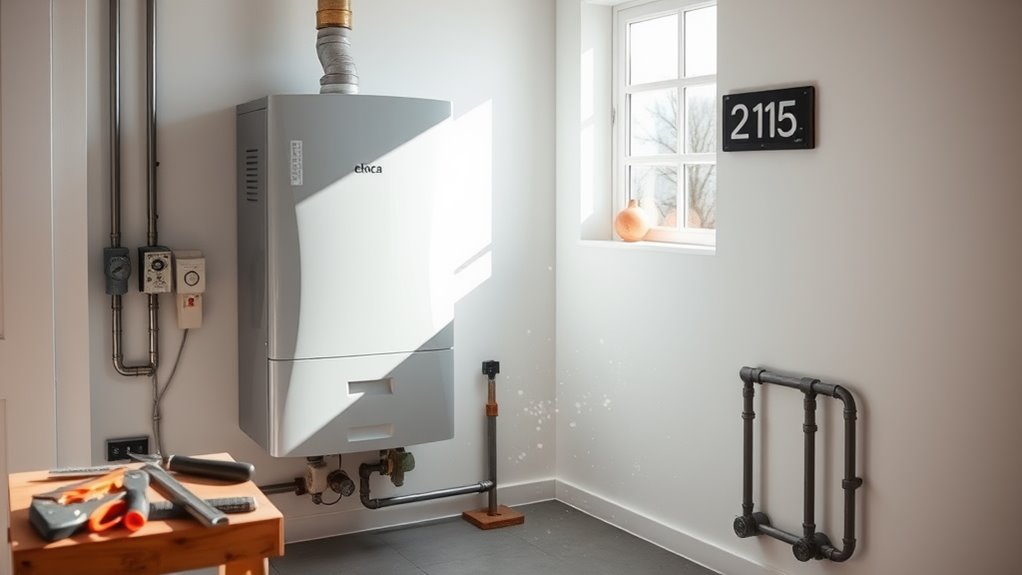Fitting a brand new boiler usually takes between one to three days. This timeframe varies based on factors like installation complexity, system compatibility, and the condition of your current setup. If modifications or repairs are needed, expect potential delays. Compliance with local codes and permit acquisition can also affect timing. To get a clearer picture of your specific situation, you may want to explore more about the installation process and common challenges involved.
Key insights
- New boiler installation typically takes between one to three days, depending on the type and complexity.
- Combi boilers usually require less time to install compared to system or conventional boilers.
- Installation delays can occur due to compatibility issues, existing system conditions, or required repairs.
- Weather conditions and technician availability may also impact the installation timeline.
- Consulting a professional installer can provide tailored estimates based on specific circumstances.
Factors Influencing Installation Time
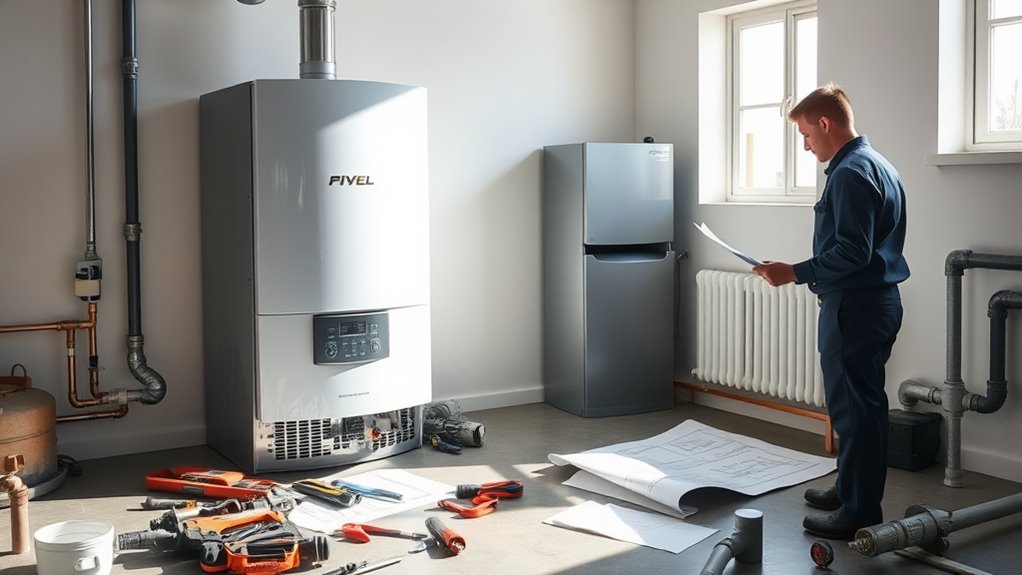
When contemplating how long it takes to fit a boiler, several factors come into play that can greatly affect the installation time. First, the installation complexity is vital; if you're upgrading from an older system, modifications may be needed to accommodate the new boiler. This can involve rerouting pipes or making electrical adjustments, all of which extend the timeline. Next, system compatibility plays a significant role. If your existing infrastructure isn't compatible with the new unit, you might face additional delays while sourcing compatible components. You'll also want to reflect on the condition of your current system, as it may require repairs before the installation can proceed. Additionally, the compliance with local building codes is crucial as it may necessitate additional inspections that can prolong the installation process. By evaluating these factors, you can better estimate the time needed for a successful boiler installation.
Typical Installation Timeframes
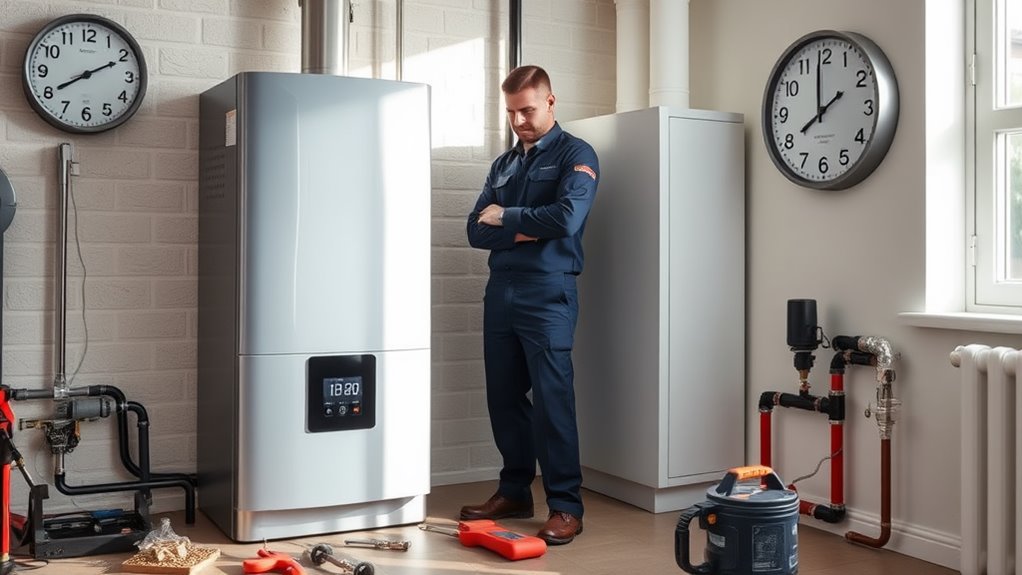
Understanding the typical installation timeframes can help you plan effectively for your boiler replacement. Generally, the installation of a new boiler takes between one to three days, depending on the boiler type and complexity of the job. For example, combi boilers often require less time, while system or conventional boilers may take longer due to additional components. You should also consider installation costs, as they can vary based on the boiler type and any necessary modifications to your existing system. By knowing these timeframes, you can better coordinate your schedule and minimize disruptions. Always consult with a professional installer for a more accurate estimate tailored to your specific situation. Regular maintenance ensures efficient operation and can further influence the longevity of your new boiler.
The Installation Process Explained
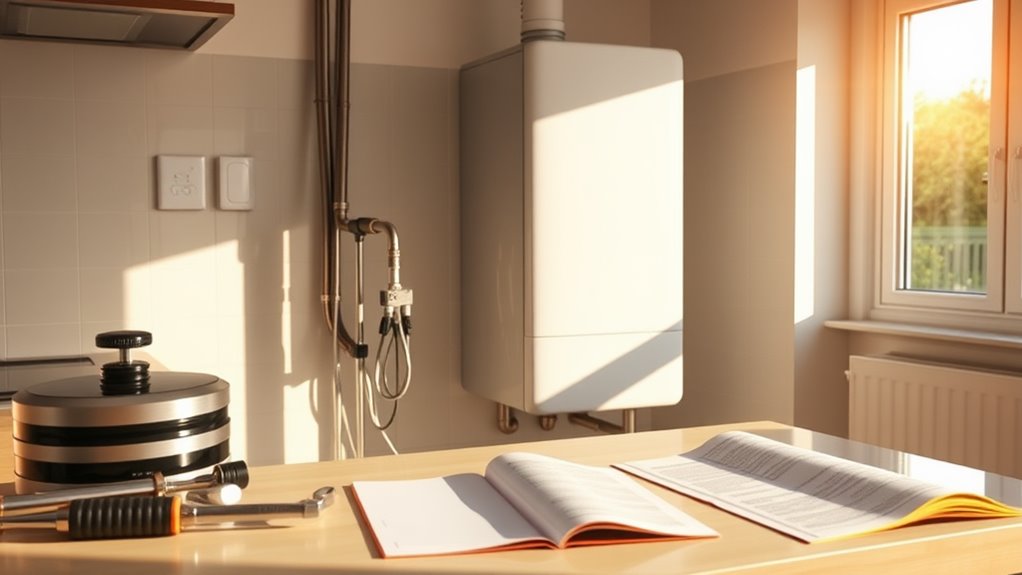
As you prepare for your boiler installation, it is essential to know the steps involved to guarantee a smooth process. Here's a breakdown of the installation process:
- Choose Boiler Types: Decide on the right boiler type for your home, whether it's a combi, system, or regular boiler.
- Obtain Installation Permits: Confirm all necessary permits are secured to comply with local regulations.
- Site Preparation: Clear the installation area and check existing plumbing or electrical systems to verify compatibility.
- Installation: The technician will remove the old boiler, install the new unit, and connect it to the existing systems. Regular maintenance of plant room systems is critical to ensure the new boiler operates efficiently and safely.
Common Challenges and Delays
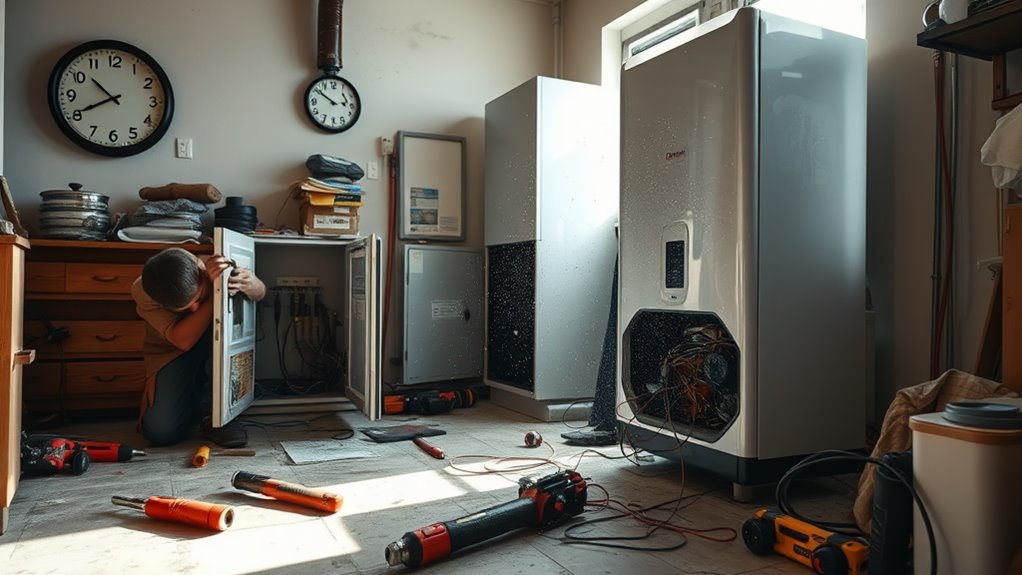
Even with a clear installation process, various challenges and delays can arise that may impact the timeline and efficiency of fitting a boiler. One common issue is installation complications, which can stem from outdated plumbing or electrical systems that require upgrades before the new boiler can be installed. This can extend the overall installation time considerably. Additionally, technician availability plays an essential role; if your preferred technician is booked or unavailable, you may face delays in scheduling the installation. Weather conditions can also affect the timeline, especially for outdoor installations. Finally, acquiring the necessary permits can sometimes take longer than expected, further pushing back your installation schedule. Awareness of these factors can help you better plan your boiler installation. Regular maintenance, such as commercial power flushing, can also help prevent future installation delays by ensuring your heating system is operating efficiently.
Tips for a Smooth Installation Experience
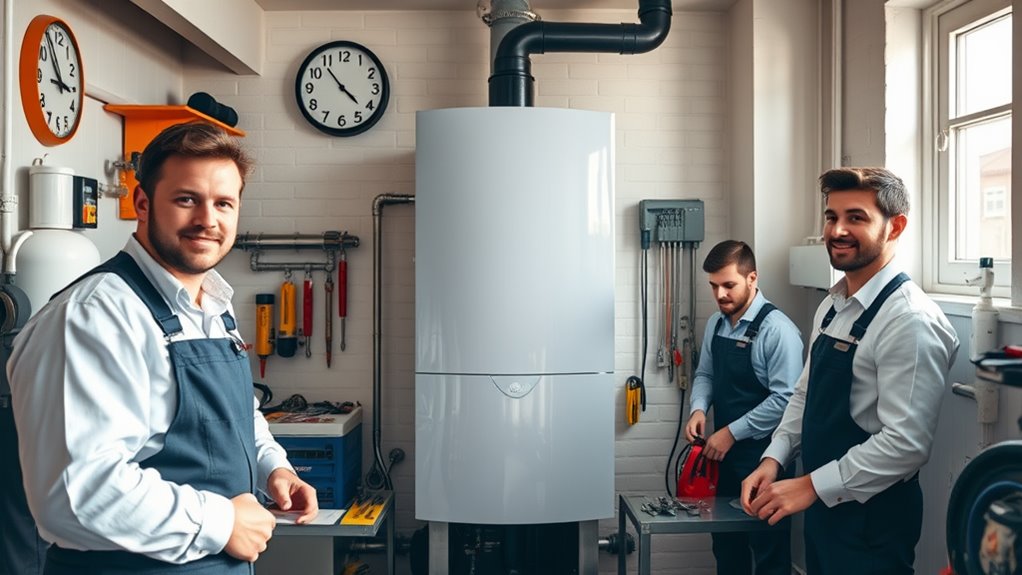
To guarantee a smooth boiler installation experience, start by conducting thorough research on the types of boilers available and their specific requirements. Follow these tips for ideal results:
- Create a pre-installation checklist: List necessary documents, permits, and equipment.
- Select a qualified contractor: Confirm they're licensed and have good reviews to avoid issues.
- Schedule a site assessment: This helps identify any potential challenges beforehand.
- Prepare your home: Clear the installation area and confirm access to necessary utilities. Additionally, ensuring that the contractor understands safety regulations is crucial for compliance during installation.
Frequently Asked Questions
Do I Need to Prepare My Home Before Installation Day?
Yes, you need to prepare your home before installation day. Make certain the boiler location is accessible, allowing your installer to work efficiently. Clear the area around the installation site of any obstacles or clutter to provide enough space clearance. Check that the power supply and gas lines are accessible and in good condition. This preparation helps streamline the installation process, reducing potential delays and making sure your new boiler operates effectively from day one.
Can I Use My Heating System During Installation?
During the boiler installation, you typically can't use your heating system, as it requires disconnection. This might lead to heating disruption in your home. However, you can explore temporary solutions like using electric heaters or blankets to stay warm. It's important to discuss your specific needs with the installer beforehand, as they may provide advice tailored to your situation, ensuring minimal disruption during the process while keeping your comfort in mind.
What if My Boiler Installation Needs to Be Rescheduled?
If your boiler installation needs to be rescheduled, it's crucial to discuss your rescheduling options with your installer as soon as possible. Installation delays can happen for various reasons, including equipment availability or unforeseen issues. By communicating promptly, you can minimize inconvenience and guarantee your heating system is up and running efficiently. Be prepared to provide flexible dates to facilitate a smoother rescheduling process. Always prioritize safety and compliance during installation.
Are There Any Permits Required for Boiler Installation?
Yes, there are permits required for boiler installation, and you need to adhere to local boiler regulations. Before you start, check the installation guidelines specific to your area. These often include obtaining permits to guarantee compliance with safety standards. Failing to secure the necessary permits can lead to fines or issues with future inspections. It's crucial to consult with a professional to navigate these requirements effectively.
How Can I Choose the Right Boiler for My Home?
Choosing the right boiler for your home involves understanding the different boiler types, such as combi, system, and regular boilers. Evaluate your heating needs and the size of your property. Don't forget to take into account energy efficiency ratings; higher efficiency can lead to lower energy bills. Research models that fit your budget and consult a professional to guarantee proper installation. This way, you'll enjoy a reliable heating solution tailored to your specific requirements.
Summary
In conclusion, fitting a brand new boiler typically takes one to three days, depending on various factors. By understanding the installation process and potential challenges, you're better prepared for a smooth experience. Make certain you've chosen a qualified technician and communicated your needs clearly. Proper planning can minimize delays and enhance efficiency. With the right preparation, you'll enjoy reliable heating in no time, making your investment in a new boiler worthwhile.

